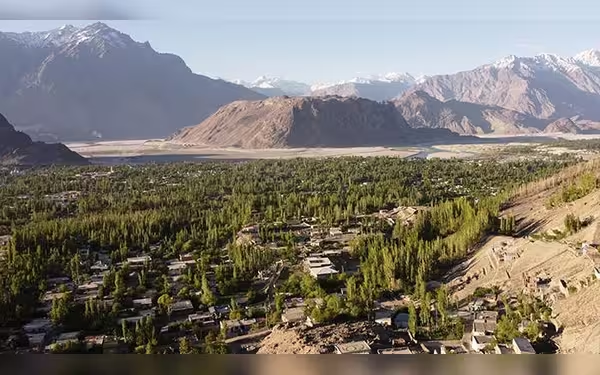Tuesday, July 2, 2024 04:41 PM
Skardu residents innovate amidst energy crisis
- Residents adapt to lifestyle without consistent electricity
- Tourism surge strains energy resources in Skardu
- Climate change impacts energy production in Gilgit-Baltistan
 Image Credits: geo
Image Credits: geoResidents in Skardu, Pakistan, face severe power outages, impacting daily life and businesses. The surge in tourism exacerbates the energy crisis, highlighting the need for sustainable solutions.
In the rugged terrains of Pakistan, residents in Skardu are facing severe challenges due to frequent power outages lasting up to 18 hours a day. This situation has forced them to adapt to a lifestyle without consistent electricity, especially with the surge in tourism, particularly among climbers and locals seeking respite from scorching temperatures as they prepare to ascend K2, the world's second-highest peak.
While upscale hotels can mitigate power shortages with solar panels or generators, many locals lack the means to afford such alternatives. As a result, they have resorted to inventive solutions like repurposing appliances and relying on traditional methods for daily tasks.
Skardu, the primary city in Gilgit-Baltistan, experiences a significant influx of visitors during the summer months, straining its already limited energy resources. The region's energy deficit is further compounded by factors such as population growth, climate change, and inadequate infrastructure.
The escalating demand for electricity has led to a steady increase in power cuts over the years, impacting businesses and livelihoods. Small-scale entrepreneurs, like tailors and craftsmen, have witnessed a decline in productivity due to unreliable power supply, prompting them to revert to manual tools and techniques.
The tourism boom in the region continues to grow, attracting both domestic and international visitors. However, this influx has put additional strain on the already burdened power grid, exacerbating the energy crisis in Skardu.
Gilgit-Baltistan, being geographically isolated, relies on its own power generation from hydro and thermal plants. Challenges such as melting glaciers have affected water availability for energy production, highlighting the impact of climate change in the region.
Efforts to bolster energy infrastructure, including projects like the Satpara dam, have not met expectations, leaving residents like Wajahat Hussain, a carpenter, dependent on fuel generators for their businesses. This dependence comes at the cost of environmental concerns, further complicating the energy situation in Skardu.
The power outages in Skardu present a complex challenge for residents, exacerbated by the region's growing tourism industry and environmental factors. As the demand for electricity continues to rise, sustainable solutions and improved infrastructure are crucial to address the energy crisis and support the livelihoods of Skardu's residents. Efforts to balance tourism growth with energy sustainability are essential for the long-term well-being of the region.













